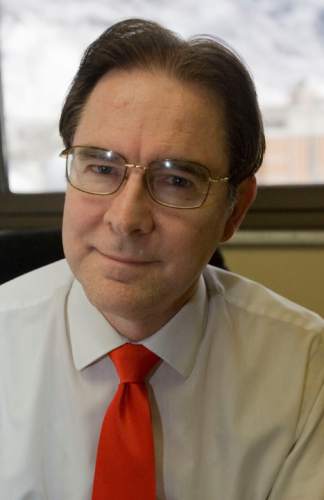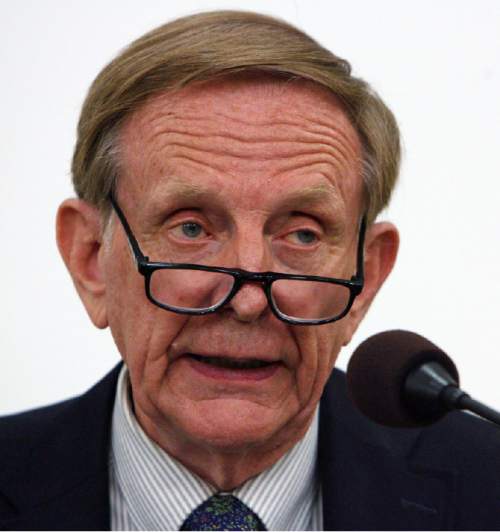This is an archived article that was published on sltrib.com in 2014, and information in the article may be outdated. It is provided only for personal research purposes and may not be reprinted.
In recent years, Ralph Hancock has witnessed what he considers a troubling trend among Mormon intellectuals — the temptation to hide their faith under the bushel of moral relativism.
The Brigham Young University political science professor believes that many LDS bloggers and scholars — even at Mormonism's flagship school — have fallen sway to secularism, which views equality as sameness, freedom as being without limits, and tolerance as more important than established morality, especially in sexual matters.
Such LDS progressives, he says, feel free to disagree with Mormon officials on issues such as same-sex marriage, the central role of the family in LDS theology and women's ordination to the faith's all-male priesthood.
And here is Hancock's deepest concern: The "dominant orientation" of the so-called bloggernacle — the universe of Mormon blogs — "assumes the moral superiority of intellectuals to church authorities."
In this world, personal conscience trumps pious pronouncements, and right and wrong are determined individually rather than collectively.
Anyone who objects to that reversal of allegiance or assumptions about equality is accused of being "intolerant, insensitive and even hateful," he says, "towards those who are hoping to find comfort in the subversion of basic moral principles."
These concerns have prompted Hancock to create "EXPAND," an online forum in conjunction with Meridian Magazine, a conservative general interest website that publishes LDS news and commentary.
In its essays and interviews, Meridian EXPAND promises to defend "core teachings of The Church of Jesus Christ of Latter-day Saints concerning morality and the family," he writes, and to engage others in vigorous debate on questions of Mormon doctrine, practices, philosophy and behavior.
It will, for example, host an online symposium on women's issues facing the Utah-based faith, featuring, among others, LDS writer Neylan McBaine, author of "Women at Church: Magnifying LDS Women's Local Impact."
The magazine also will explore "Seeking the Promised Land: Mormons and American Politics" by David Campbell of the University of Notre Dame, John Green of the University of Akron and Quin Monson of BYU, along with the work of Patrick Mason, head of Mormon studies at Claremont Graduate University in Southern California.
It already has published an interview with LDS scholar Terryl Givens, co-author with his wife, Fiona Givens, of the "Crucible of Doubt: Reflections on the Quest for Faith."
Several Mormon scholars share Hancock's fears about the insidious nature of secularism but also worry about overreacting and condemning colleagues.
"There is a danger in underscoring LDS leaders' fallibility," says Mormon historian Richard Bushman, emeritus professor at Columbia, "and losing sight of [the leaders'] calling and position for receiving revelation for the church."
Bushman, author of "Rough Stone Rolling," an acclaimed biography of Mormon founder Joseph Smith, says he is more inclined than Hancock to "trust the sincerity of these intellectuals who are good and faithful members who believe that the positions they are taking are sound and consistent with the gospel."
The historian doesn't believe these members should be considered in error or halfway apostate, as Hancock seems to suggest, but Bushman would like to see a real debate about the question of moral relativity among LDS scholars.
Adam Miller, a Mormon who teaches philosophy at Collin College in McKinney, Texas, agrees that some LDS intellectuals take a nonreligious approach to church history and contemporary questions, leaving little room for faith.
"Some academics have downplayed their Mormonism to gain professional credibility," Miller says, "and that is a legitimate concern."
However, Miller, author of "Letters to a Young Mormon," also understands the need to do so — and it isn't all bad.
"To do well in your profession, you have to accept its framework — the shared framework of the academy is secular," he says. "There are problems with that, but also advantages."
Hancock overgeneralizes the problem and "poses false choices," Miller says. "He thinks the work can be conducted in a straightforward way that will vindicate what we already think."
The philosophy professor is a lot less confident of that approach.
To engage honestly in a public dialogue about these issues is "messy," Miller says, "and will involve mutual transformations of both positions."
BYU political scientist Richard Davis already has debated Hancock on the question of moral relativity among Mormons.
Davis, author of "The Liberal Soul: Applying the Gospel of Jesus Christ in Politics," respects Hancock as a thinker and says his BYU colleague's arguments are more complex than they might seem.
Still, Davis opposes any "blanket condemnation" of Mormons who differ from church leaders on certain issues.
"The church has taken a policy position [against] same-sex marriage, for instance, and that's pretty clear," he says. "But the church is not saying you cannot be a good Mormon and support same-sex marriage."
In fact, members are not even asked their stance on that or other hot-button topics when they seek permission to enter the faith's temples.
"Local church leaders interview a member who seeks a temple recommend to confirm that the member's actions and beliefs are in harmony with church teachings," LDS Church spokesman Cody Craynor explained earlier this year. "Church leaders use a list of questions that are provided for this purpose and are instructed not to add any additional requirements."
Indeed, many Mormons are growing comfortable supporting same-sex couples in wider society. In January, a Salt Lake Tribune poll showed 32 percent of LDS Utahns believe same-sex couples should be allowed to get civil marriage licenses.
So, if a Latter-day Saint accepts the notion that the world is complex and that Mormonism doesn't have a monopoly on truth, is that a sign of moral relativism or a lack of faith?
Neither, Davis says, just a little humility.
For Hancock, though, true humility requires adherence to revealed religion.
An irreligious culture "intimidates some of the best of the rising generation by presenting them with this alternative: You can be counted among the smart people, or you can cling to your groundless and cruel prejudices," Hancock writes in an article called "Keeping Faith in Provo." "BYU shows little interest in articulating a third choice: an intellectual defense of openness to unfashionable truths."
Twitter: @religiongal





